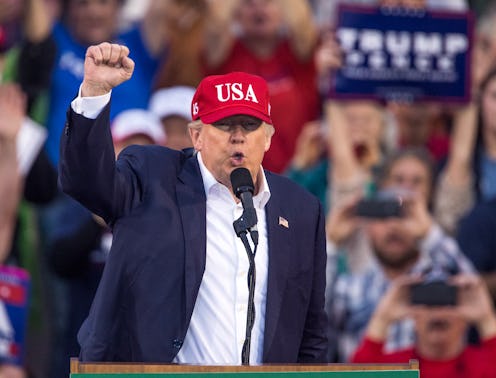News
Cost May Prevent Mass Deportations Under Trump
A San Francisco think tank is fighting back against Donald Trump's pledge to repeal President Obama's immigrant-related executive orders, and it's using the one defense that might actually work against him: money. The Immigrant Legal Resource Center published a study last week showing the startling economic cost of Trump's proposed Deferred Action for Childhood Arrivals (DACA) repeal: an estimated $3.4 billion. The economic pitfall the country would potentially face after a DACA repeal may force Trump's hand on a major campaign promise, once again testing his commitment to the things he said versus the symbolism of his movement.
As shockingly high as that number is, it is only an estimate of one of the many economic repercussions that repealing DACA would create. According to the ILRC study, the $3.4 billion figure only accounts for the cost that businesses would incur attempting to replace the workers who would no longer have the legal right to work in the United States. This estimate does not include the various other costs of repeal, including court time, lost income, and potential deportation. Other studies have shown that the loss to GDP over 10 years if Trump repeals the DACA program could be $433.4 billion.
In addition to economic loss, the study estimated how much funding would have to be cut from Medicare and Social Security to cover the financial fallout of a DACA repeal. The loss of the approximately 645,000 workers who would be affected by a DACA repeal would significantly decrease the payments going into these social programs. Medicare and Social Security would lose about $24.6 billion over 10 years, without even considering the loss of state and federal income taxes.
“By ending DACA, the President-elect would be undermining the nation’s promise to our retirees through the Social Security and Medicare trust funds and creating completely avoidable costs for employers. Ending DACA would mean leaving billions of dollars of revenue on the table, a misguided fiscal policy that would threaten the health of the American economy,” stated Jose Magaña-Salgado, Managing Policy Attorney at the Immigrant Legal Resource Center and author of the report.
Trump's decision on DACA in light of this new report could reveal his preference in the dueling aspects of his political ideology. While Trump based his political reputation on making money and good deals, he also attracted many of his followers by adopting xenophobic and anti-immigration rhetoric. Ironically, he'll have to make a choice between the lesser of the two evils, which may then define his presidential priorities. The literal Trump said he wants to forcibly remove all 11 million undocumented immigrants, but the wildly unpredictable symbolic Trump may choose the economic health of the country instead.
